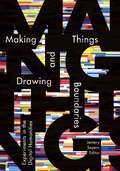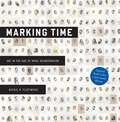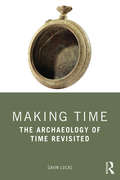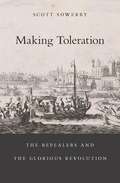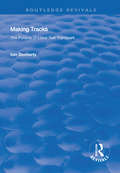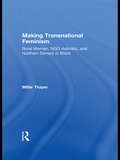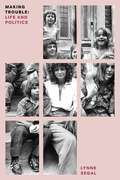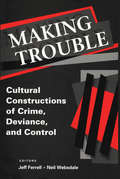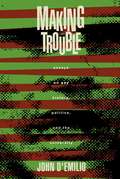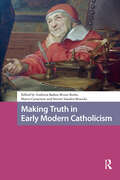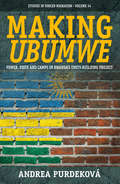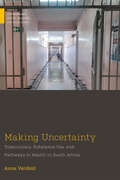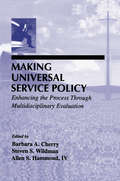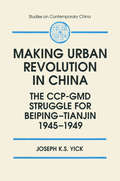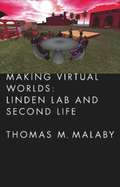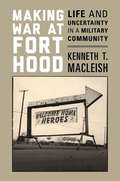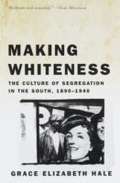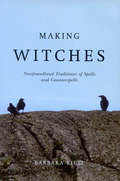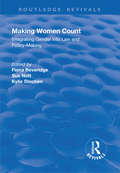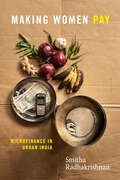- Table View
- List View
Making Things and Drawing Boundaries: Experiments in the Digital Humanities (Debates in the Digital Humanities)
by Jentery SayersIn Making Things and Drawing Boundaries, critical theory and cultural practice meet creativity, collaboration, and experimentation with physical materials as never before. Foregrounding the interdisciplinary character of experimental methods and hands-on research, this collection asks what it means to &“make&” things in the humanities. How is humanities research manifested in hand and on screen alongside the essay and monograph? And, importantly, how does experimentation with physical materials correspond with social justice and responsibility? Comprising almost forty chapters from ninety practitioners across twenty disciplines, Making Things and Drawing Boundaries speaks directly and extensively to how humanities research engages a growing interest in &“maker&” culture, however &“making&” may be defined.Contributors: Erin R. Anderson; Joanne Bernardi; Yana Boeva; Jeremy Boggs; Duncan A. Buell; Amy Burek; Trisha N. Campbell; Debbie Chachra; Beth Compton; Heidi Rae Cooley; Nora Dimmock; Devon Elliott; Bill Endres; Katherine Faull; Alexander Flamenco; Emily Alden Foster; Sarah Fox; Chelsea A. M. Gardner; Susan Garfinkel; Lee Hannigan; Sara Hendren; Ryan Hunt; John Hunter; Diane Jakacki; Janelle Jenstad; Edward Jones-Imhotep; Julie Thompson Klein; Aaron D. Knochel; J. K. Purdom Lindblad; Kim Martin; Gwynaeth McIntyre; Aurelio Meza; Shezan Muhammedi; Angel David Nieves; Marcel O&’Gorman; Amy Papaelias; Matt Ratto; Isaac Record; Jennifer Reed; Gabby Resch; Jennifer Roberts-Smith; Melissa Rogers; Daniela K. Rosner; Stan Ruecker; Roxanne Shirazi; James Smithies; P. P. Sneha; Lisa M. Snyder; Kaitlyn Solberg; Dan Southwick; David Staley; Elaine Sullivan; Joseph Takeda; Ezra Teboul; William J. Turkel; Lisa Tweten.
Making Time: Art in the Age of Mass Incarceration`
by Nicole R. Fleetwood"A powerful document of the inner lives and creative visions of men and women rendered invisible by America’s prison system. More than two million people are currently behind bars in the United States. Incarceration not only separates the imprisoned from their families and communities; it also exposes them to shocking levels of deprivation and abuse and subjects them to the arbitrary cruelties of the criminal justice system. Yet, as Nicole Fleetwood reveals, America’s prisons are filled with art. Despite the isolation and degradation they experience, the incarcerated are driven to assert their humanity in the face of a system that dehumanizes them. Based on interviews with currently and formerly incarcerated artists, prison visits, and the author’s own family experiences with the penal system, Marking Time shows how the imprisoned turn ordinary objects into elaborate works of art. Working with meager supplies and in the harshest conditions—including solitary confinement—these artists find ways to resist the brutality and depravity that prisons engender. The impact of their art, Fleetwood observes, can be felt far beyond prison walls. Their bold works, many of which are being published for the first time in this volume, have opened new possibilities in American art. As the movement to transform the country’s criminal justice system grows, art provides the imprisoned with a political voice. Their works testify to the economic and racial injustices that underpin American punishment and offer a new vision of freedom for the twenty-first century."
Making Time: The Archaeology of Time Revisited
by Gavin LucasMaking Time grapples with a range of issues that have crystallized in the wake of 15 years of discussion on time in archaeology, since the author's seminal volume The Archaeology of Time, synthesizing them for a new generation of scholars. The general understanding of time held by both archaeologists and non-archaeologists is often very simple: a linear notion where time flows along a single path from the past into the future. This book sets out to complicate this image, to draw out the key problems and issues with time that impact archaeological interpretation. Using concrete examples drawn from different periods and places, the book challenges the reader to think again. Ultimately, the book will suggest that if we want to understand what archaeological time is, then we need to accept that things do not exist in time, they make time. The crucial question then becomes: what kinds of time do archaeological materialities produce? Written for upper level undergraduates and researchers in archaeology, the book is also accessible to non-academics with an interest in the topic. The book is relevant for cognate disciplines, especially history, heritage studies and philosophy.
Making Toleration: The Repealers and the Glorious Revolution
by Scott SowerbyIn the reign of James II, minority groups from across the religious spectrum, led by the Quaker William Penn, rallied together under the Catholic King James in an effort to bring religious toleration to England. Known as repealers, these reformers aimed to convince Parliament to repeal laws that penalized worshippers who failed to conform to the doctrines of the Church of England. Although the movement was destroyed by the Glorious Revolution, it profoundly influenced the post-revolutionary settlement, helping to develop the ideals of tolerance that would define the European Enlightenment. Based on a rich array of newly discovered archival sources, Scott Sowerby’s groundbreaking history rescues the repealers from undeserved obscurity, telling the forgotten story of men and women who stood up for their beliefs at a formative moment in British history. By restoring the repealer movement to its rightful prominence, Making Toleration also overturns traditional interpretations of King James II’s reign and the origins of the Glorious Revolution. Though often depicted as a despot who sought to impose his own Catholic faith on a Protestant people, James is revealed as a man ahead of his time, a king who pressed for religious toleration at the expense of his throne. The Glorious Revolution, Sowerby finds, was not primarily a crisis provoked by political repression. It was, in fact, a conservative counter-revolution against the movement for enlightened reform that James himself encouraged and sustained.
Making Tracks: The Politics of Local Rail Transport (Routledge Revivals)
by Iain DochertyFirst published in 1999, this book contains case studies of rail transport policy-making in two UK Passenger Transport Authority areas and reviews the factors informing such policy-making. It contributes to transport geography by explaining why the actual policies implemented in Starthclyde and Merseyside were pursued, and to the continuing development of the political science theory of ‘the urban policy regime’ by analysing the differences in policy development attributable to the different ‘city-regional’ (Strathclyde) and ‘public choice’ (Merseyside) geographical structures of local governance. The book demonstrates that these differences in the spatial organisation of local institutions play a powerful role in determining the operation of the local ‘regime’ of policy-makers, the form of final policy outputs, and the level of public accountability achieved.
Making Transnational Feminism: Rural Women, NGO Activists, and Northern Donors in Brazil
by Millie ThayerThis ethnographic study examines the transnational relations among feminist movements at the end of the twentieth century, exploring two differently situated women’s organizations in the Northeast Brazilian state of Pernambuco. The conventional narrative of globalization tells the story of inexorable forces beyond the capacity of individuals to mute or transcend. But this study tells a different story, one of social actors purposefully weaving cross-border relationships. From this vantage point, global social forces are not immaculately conceived. Instead, they are constituted by human actors with their own interests and identities, located in particular social contexts. Making Transnational Feminism takes what some have called "global civil society" as its object, moving beyond both dire predictions and euphoric celebrations to understand how transnational political relationships are constructed and sustained across social and geographical divides. It also provides a compelling case study for use in advanced undergraduate and graduate courses in globalization, gender studies, and social movements.
Making Trouble
by Lynne SegalWhat happens when angry young rebels become wary older women, ageing in a leaner, meaner time: a time which exalts only the ‘new’, in a ruling orthodoxy daily disparaging all it portrays as the ‘old’? Delving into her own life and those of others who left their mark on it, Lynne Segal tracks through time to consider her generation of female dreamers, what formed them, how they left their mark on the world, where they are now in times when pessimism seems never far from what remains of public life. Searching for answers, she studies her family history, sexual awakening, ethnic belonging, as well as the peculiarities of the time and place that shaped her own political journeys, with all their urgency, significance, pleasures and absurdities.From the Trade Paperback edition.
Making Trouble: Cultural Constraints of Crime, Deviance, and Control
by Jeff FerrellIn Making Trouble leading scholars in criminology, sociology, criminal justice, women's studies, and social history explore the mediated cultural dynamics that construct images and understanding of crime, deviance, and control. Contributors examine the intertwined practices of the mass media, criminal justice agencies, political power holders, and criminal and deviant subcultures in producing and consuming contested representations of legality and illegality. While the collection provides broad analysis of contemporary topics, it also weaves this analysis around a set of innovative and unifying themes. These include the emergence of ""situated media"" within and between the various subcultures of crime, deviance, and control; the evolution of policing and social control as complex webs of mediated and symbolic meaning; the role of power, identity, and indifference in framing contemporary crime controversies, with special attention paid to the gendered construction of crime, deviance and control; and the importance of historical and cross-cultural dynamics in shaping understandings of crime, deviance, and control.
Making Trouble: Essays on Gay History, Politics, and the University
by John D'EmilioFirst Published in 1992. Routledge is an imprint of Taylor & Francis, an informa company.
Making Truth in Early Modern Catholicism (Scientiae Studies)
by Andreea Badea Bruno Boute Marco Cavarzere Steven Vanden BroeckeScholarship has come to value the uncertainties haunting early modern knowledge cultures; indeed, awareness of the fragility and plurality of knowledge is now offered as a key element for understanding early modern science as a whole. Yet early modern actors never questioned the possibility of certainty itself and never objected to the notion that truth is out there, universal, and therefore safe from human manipulation. This book investigates how early modern actors managed not to succumb to postmodern relativism, despite the increasing uncertainties and blatant disagreements about the nature of God, Man, and the Universe. An international and interdisciplinary team of experts in fields ranging from the history of science to theology and the history of ideas analyses a number of practices that were central to maintaining and functionalizing the notion of absolute truth. Through such an interdisciplinary research the book shows how certainty about truth could be achieved, and how early modern society recognized the credibility of a wide plethora of actors in differentiating fields of knowledge.
Making Ubumwe: Power, State and Camps in Rwanda's Unity-Building Project (Forced Migration #34)
by Andrea PurdekováSince the end of the Rwandan genocide, the new political elite has been challenged with building a unified nation. Reaching beyond the better-studied topics of post-conflict justice and memory, the book investigates the project of civic education, the upsurge of state-led neo-traditional institutions and activities, and the use of camps and retreats shape the "ideal" Rwandan citizen. Rwanda's ingando camps offer unique insights into the uses of dislocation and liminality in an attempt to anchor identities and desired political roles, to practically orient and symbolically place individuals in the new Rwandan order, and, ultimately, to create additional platforms for the reproduction of political power itself.
Making Uncertainty: Tuberculosis, Substance Use, and Pathways to Health in South Africa (Medical Anthropology)
by Anna VersfeldIn Cape Town, South Africa, many people with tuberculosis also use substances. This sets up a seemingly impossible problem: People who use substances are at increased risk of tuberculosis disease; and substance use seems to result in erratic behavior that makes successful treatment of people affected by tuberculosis extremely difficult. People affected don’t get healthy, healthcare providers are frustrated, and families seek to balance love and care for those who are ill with self-protection. How are we to understand this? Where does the responsibility for poor health and healing lie? What are the possibilities for an effective healthcare response? Through a close look at lives and care, Making Uncertainty: Tuberculosis, Substance Use, and Pathways to Health shows how patterns of substance use, tuberculosis disease, and their interaction are shaped by history, social context, and political economy. This, in turn, generates new perspectives on what makes poor health, and what good care might look like.
Making Universal Service Policy: Enhancing the Process Through Multidisciplinary Evaluation (LEA Telecommunications Series)
by Iv Barbara A. Cherry Steven S. Wildman Allen S. HammondThis book is the outgrowth of shared interests between the editors and the contributing authors to provide a multidisciplinary perspective in evaluating universal service policy and recommending policy changes to accommodate a more competitive telecommunications environment. The book is interdisciplinary in nature to reflect the extremely complex context in which universal service policy is formed. The chapter authors represent a broad cross-section of disciplinary training, professional positions, and relationships in the telecommunications industry. Academic disciplines represented include law, economics, anthropology, communication, and business. This book's purpose is to significantly enhance the development of effective telecommunications universal service policy among policymakers, industry members, and stakeholders in the United States. Universal service policy has been, and will continue to be, both enabled and constrained by the simultaneous interaction of social, political, technological, and economic forces in the environment in which it is formed. A more effective process for policy design is to seek agreement on how entitlements embedded in universal service policy should be modified as circumstances invariably change over time. Therefore, the volume reflects recent significant developments in U.S. universal service policy--the implementation of which continues to unfold.
Making Up the Difference
by Erynn Masi de CasanovaGlobalization and economic restructuring have decimated formal jobs in developing countries, pushing many women into informal employment such as direct selling of cosmetics, perfume, and other personal care products as a way to "make up the difference" between household income and expenses. In Ecuador, with its persistent economic crisis and few opportunities for financially and personally rewarding work, women increasingly choose direct selling as a way to earn income by activating their social networks. While few women earn the cars and trips that are iconic prizes in the direct selling organization, many use direct selling as part of a set of household survival strategies. In this first in-depth study of a cosmetics direct selling organization in Latin America, Erynn Masi de Casanova explores women's identities as workers, including their juggling of paid work and domestic responsibilities, their ideas about professional appearance, and their strategies for collecting money from customers. Focusing on women who work for the country's leading direct selling organization, she offers fascinating portraits of the everyday lives of women selling personal care products in Ecuador's largest city, Guayaquil. Addressing gender relations (including a look at men's direct and indirect involvement), the importance of image, and the social and economic context of direct selling, Casanova challenges assumptions that this kind of flexible employment resolves women's work/home conflicts and offers an important new perspective on women's work in developing countries.
Making Urban Revolution in China: The CCP-GMD Struggle for Beiping-Tianjin, 1945-49 (Studies On Contemporary China)
by Joseph K.S. YickThe end of the Sino-Japanese War in 1945 brought not peace but renewed confrontation between Mao Zedong's Chinese Communist Party and Chiang Kaishek's Guomindang. The ensuing Civil War, at the threshold of the Cold War, held enormous significance for international strategic alliances, and in particular the interests of the United States in East Asia, and has been the subject of intense research and debate ever since. Joseph Yick's Making Urban Revolution in China: The CCP-GMD Struggle for Beiping-Tianjin, 1945-1949, based partly on the rich new sources available in the PRC since 1978, rethinks the traditional interpretations of the Chinese Communist Party's victory in 1949 and makes a major contribution to the historiography of this period.
Making Virtual Worlds: Linden Lab and Second Life
by Thomas M. MalabyThe past decade has seen phenomenal growth in the development and use of virtual worlds. In one of the most notable, Second Life, millions of people have created online avatars in order to play games, take classes, socialize, and conduct business transactions. Second Life offers a gathering point and the tools for people to create a new world online. Too often neglected in popular and scholarly accounts of such groundbreaking new environments is the simple truth that, of necessity, such virtual worlds emerge from physical workplaces marked by negotiation, creation, and constant change. Thomas Malaby spent a year at Linden Lab, the real-world home of Second Life, observing those who develop and profit from the sprawling, self-generating system they have created. Some of the challenges created by Second Life for its developers were of a very traditional nature, such as how to cope with a business that is growing more quickly than existing staff can handle. Others are seemingly new: How, for instance, does one regulate something that is supposed to run on its own? Is it possible simply to create a space for people to use and then not govern its use? Can one apply these same free-range/free-market principles to the office environment in which the game is produced? "Lindens"-as the Linden Lab employees call themselves-found that their efforts to prompt user behavior of one sort or another were fraught with complexities, as a number of ongoing processes collided with their own interventions. Malaby thoughtfully describes the world of Linden Lab and the challenges faced while he was conducting his in-depth ethnographic research there. He shows how the workers of a very young but quickly growing company were themselves caught up in ideas about technology, games, and organizations, and struggled to manage not only their virtual world but also themselves in a nonhierarchical fashion. In exploring the practices the Lindens employed, he questions what was at stake in their virtual world, what a game really is (and how people participate), and the role of the unexpected in a product like Second Life and an organization like Linden Lab.
Making Volunteers: Civic Life after Welfare's End (Princeton Studies in Cultural Sociology #50)
by Nina EliasophAn inside look at how community service organizations really workVolunteering improves inner character, builds community, cures poverty, and prevents crime. We've all heard this kind of empowerment talk from nonprofit and government-sponsored civic programs. But what do these programs really accomplish? In Making Volunteers, Nina Eliasoph offers an in-depth, humorous, wrenching, and at times uplifting look inside youth and adult civic programs. She reveals an urgent need for policy reforms in order to improve these organizations and shows that while volunteers learn important lessons, they are not always the lessons that empowerment programs aim to teach.With short-term funding and a dizzy mix of mandates from multiple sponsors, community programs develop a complex web of intimacy, governance, and civic life. Eliasoph describes the at-risk youth served by such programs, the college-bound volunteers who hope to feel selfless inspiration and plump up their resumés, and what happens when the two groups are expected to bond instantly through short-term projects. She looks at adult "plug-in" volunteers who, working in after-school programs and limited by time, hope to become like beloved aunties to youth. Eliasoph indicates that adult volunteers can provide grassroots support but they can also undermine the family-like warmth created by paid organizers. Exploring contradictions between the democratic rhetoric of empowerment programs and the bureaucratic hurdles that volunteers learn to navigate, the book demonstrates that empowerment projects work best with less precarious funding, more careful planning, and mandatory training, reflection, and long-term commitments from volunteers.Based on participant research inside civic and community organizations, Making Volunteers illustrates what these programs can and cannot achieve, and how to make them more effective.
Making War at Fort Hood: Life and Uncertainty in a Military Community
by Kenneth T. MacLeishAn intimate look at war through the lives of soldiers and their families at Fort HoodMaking War at Fort Hood offers an illuminating look at war through the daily lives of the people whose job it is to produce it. Kenneth MacLeish conducted a year of intensive fieldwork among soldiers and their families at and around the US Army's Fort Hood in central Texas. He shows how war's reach extends far beyond the battlefield into military communities where violence is as routine, boring, and normal as it is shocking and traumatic.Fort Hood is one of the largest military installations in the world, and many of the 55,000 personnel based there have served multiple tours in Iraq and Afghanistan. MacLeish provides intimate portraits of Fort Hood's soldiers and those closest to them, drawing on numerous in-depth interviews and diverse ethnographic material. He explores the exceptional position that soldiers occupy in relation to violence--not only trained to fight and kill, but placed deliberately in harm's way and offered up to die. The death and destruction of war happen to soldiers on purpose. MacLeish interweaves gripping narrative with critical theory and anthropological analysis to vividly describe this unique condition of vulnerability. Along the way, he sheds new light on the dynamics of military family life, stereotypes of veterans, what it means for civilians to say "thank you" to soldiers, and other questions about the sometimes ordinary, sometimes agonizing labor of making war.Making War at Fort Hood is the first ethnography to examine the everyday lives of the soldiers, families, and communities who personally bear the burden of America's most recent wars.
Making Waves behind Bars: The Prison Radio Association
by Charlotte BedfordRadio produced and broadcast behind prison walls is redefining traditional meanings of ‘public service broadcasting’ and disrupting traditional power structures within the prison system. Focusing on one of the most interesting developments in UK prisons over the past 10 years, this book examines the early history of the Prison Radio Association and the formation of the first national radio station for prisoners. Highlighting the enduring importance of social values in broadcasting this book shows how radio can be used as a powerful force for social change. It will be of interest to those involved in media, criminal justice and social activism.
Making Weight
by M.D. Arnold Andersen Leigh Cohn M.D. Tom HolbrookThe negative body-image epidemic that affects millions of women is also a hidden problem for millions of men. In spite of a decade-long emphasis on health and fitness - or perhaps because of it - more men are suffering from a variety of eating disorders and self-abusive behaviors. Using vignettes from their patients, the authors present a new program to help men overcome these problems. They offer ways to enhance self-image, facts about why diets fail, information about the dangers of using steroids, and a section for women who want to help the men in their life.
Making Whiteness: The Culture of Segregation in the South, 1890-1940
by Grace Elizabeth HaleThis book explains how and why whiteness came to be such a crucial, embattled--and distorting--component of twentieth-century American identity.
Making Witches: Newfoundland Traditions of Spells and Counterspells
by Barbara RietiThere is a little-known tradition of witch lore in Newfoundland culture. Those believed to have the power to influence the fortunes of others are not mythological characters but neighbours, relations, or even friends. Drawing from her own interviews and a wealth of material from the Memorial University Folklore and Language Archive, Barbara Rieti explores the range and depth of Newfoundland witch tradition, looking at why certain people acquired reputations as witches, and why others considered themselves bewitched. The tales that emerge - despite their seemingly fantastic elements of spells and black heart books, hags, and healing charms - concern everyday affairs and reveal the intense social interdependence central to outport life. Frequently featuring women, they provide fascinating new perspectives on female coping strategies in a volatile economy. By addressing the perennial human issues at the heart of witchcraft - construction of enmity and intertwined fate - these narrative accounts also illuminate older witch beliefs revealed in witchcraft trial documents. Making Witches shows that in storytelling communities with a rich legacy of witch lore, witch tradition has endured well into the twentieth century.
Making Women Count: Integrating Gender into Law and Policy-making
by Kylie StephenThis title was first published in 2000. Drawn from an international research project, this study provides evidence of efforts to make law and policy-making truly inclusive, and discusses whether success or failure depends on the nature of the procedure, or the legal and social context. The book contains six case studies detailing national practice in promoting equality between the sexes and a series of general chapters which evaluate the effectiveness of individual equality stratgies and the factors which contribute to their success or failure. The contributors analyze the contribution of the European Union in promoting gender equality in Europe, and particular emphasis is placed on gender mainstreaming and how this strategy might be developed.
Making Women Pay: Microfinance in Urban India
by Smitha RadhakrishnanIn Making Women Pay, Smitha Radhakrishnan explores India's microfinance industry, which in the past two decades has come to saturate the everyday lives of women in the name of state-led efforts to promote financial inclusion and women's empowerment. Despite this favorable language, Radhakrishnan argues, microfinance in India does not provide a market-oriented development intervention, even though it may appear to help women borrowers. Rather, this commercial industry seeks to extract the maximum value from its customers through exploitative relationships that benefit especially class-privileged men. Through ethnography, interviews, and historical analysis, Radhakrishnan demonstrates how the unpaid and underpaid labor of marginalized women borrowers ensures both profitability and symbolic legitimacy for microfinance institutions, their employees, and their leaders. In doing so, she centralizes gender in the study of microfinance, reveals why most microfinance programs target women, and explores the exploitative implications of this targeting.
Making Women’s Histories: Beyond National Perspectives
by Kate Haulman Pamela S. NadellExamines how women's histories are explored and explained around the worldMaking Women's Histories showcases the transformations that the intellectual and political production of women’s history has engendered across time and space. It considers the difference women’s and gender history has made to and within national fields of study, and to what extent the wider historiography has integrated this new knowledge. What are the accomplishments of women’s and gender history? What are its shortcomings? What is its future?The contributors discuss their discovery of women’s histories, the multiple turns the field has taken, and how place affected the course of this scholarship. Noted scholars of women’s and gender history, they stand atop such historiographically-defined vantage points as Tsarist Russia, the British Empire in Egypt and India, Qing-dynasty China, and the U.S. roiling through the 1960s. From these and other peaks they gaze out at the world around them, surveying trajectories in the creation of women’s histories in recent and distant pasts and envisioning their futures.
